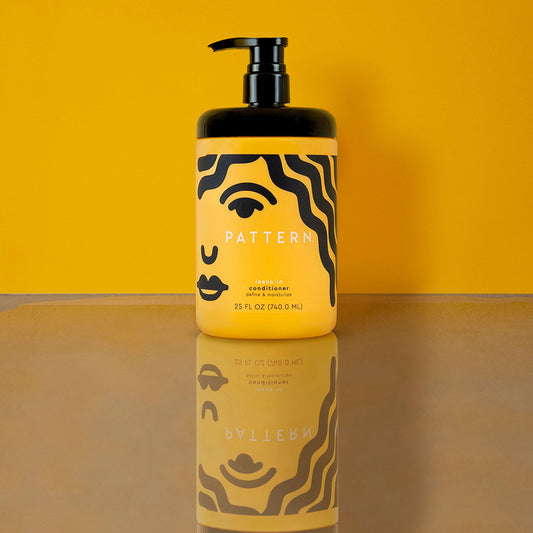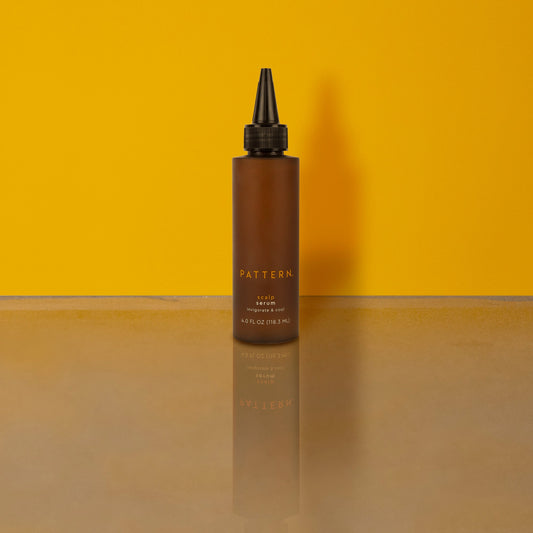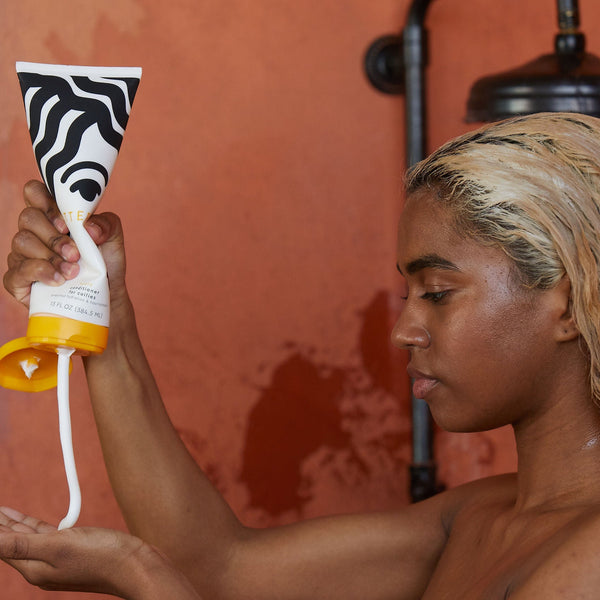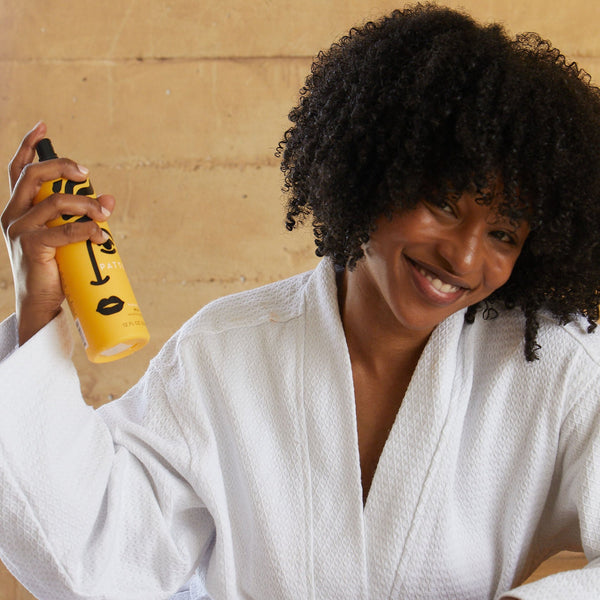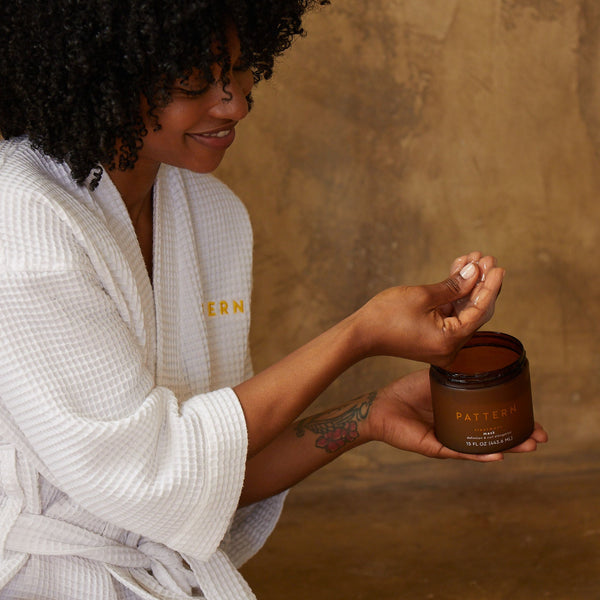When you’re having a gorgeous hair day, you deserve to be worry-free about a flaky, itchy scalp. While dandruff is typically harmless, it can be uncomfortable or have an impact on one’s self-esteem. Keeping a clean, moisturized and healthy scalp not only leads to healthy hair, but it can also prevent hair loss and promotes hair growth. If you’re concerned about the appearance of shedding flakes, you may be interested in scalp exfoliation to help improve scalp health.
Regular scalp exfoliation can help prevent the build-up of oil, excess sebum, dead skin cells, or hair products. When these things build up around the hair follicle, you can risk folliculitis if left untreated for an extended period of time. Folliculitis occurs when the hair follicle becomes inflamed and infected. When severe, this can lead to hair loss. Your hair follicles also contain your sebaceous gland which produces sebum, complex oils containing cholesterol and fatty acid, which feed bacteria and fungi. This can lead to acne or infection. Exfoliating your scalp and using natural hair care products helps to reduce scalp buildup and maintain healthy hair.
How do you exfoliate your scalp?
A scalp exfoliant can be either chemical or physical. If you physically are exfoliating dead skin cells, you may simply take a comb or brush to a flaky scalp and manually remove dandruff. If you’re wondering how to get rid of dandruff, there are quite a number of options. Manual exfoliation may also include the use of a scalp scrub, with small grainy particles like baking soda that physically slough off dead skin cells.
However manual exfoliation on your scalp, just like on your face, is not without risk. When not using the necessary precautions, a physical exfoliant can be too aggressive and cause minor cracks or tears on the surface of the skin. Be gentle and take your time. Cracks in the skin of the scalp can actually yield a way to allow fungus or yeast to seep below the scalp and bloodstream. Candida, a commonly known yeast, can enter the body through cracks in the scalp and spread to other areas of the body.
A slightly more gentle form of exfoliation is chemical exfoliation. Several brands carry a form of salicylic acid, a chemical exfoliant often found in skin care, in shampoos and conditioners. While this may be helpful to those seeking to balance an oily scalp, salicylic acid can be drying and unfavorable for curly, coily and tight textures. Unless specifically recommended by a physician, we recommend gentler remedies followed by shampoo and conditioner for natural hair.
How can I exfoliate my scalp at home?
Many home remedies have become so popular and trusted that they have expanded into professional hair care. The leading solution? Tea Tree Oil. This ingredient is found in several popular scalp treatments, but you can also use pure tea tree oil on its own. It’s recommended that you do not put Tea Tree Oil on broken or irritated skin.
Mix Tea Tree Oil and carrier oils such as Jojoba Oil or Argan Oil to prevent the Tea Tree Oil from being too potent. Apply to your scalp and hair. Allow it to stay in your hair for 20 minutes. Then rinse out thoroughly with a clarifying shampoo. Tea Tree Oil may tingle, but discontinue use if you notice any prolonged discomfort or scalp irritation.
Many also swear by Apple Cider Vinegar. The validity behind the claims of its healing properties is still under-researched. Some believe that it can control bacteria and fungi on the scalp that can lead to conditions that cause flaking such as seborrheic dermatitis. Apple Cider Vinegar is packed with vitamins and minerals that are good for hair. Some also believe it contains AHAs which aid in scalp exfoliation and has anti-inflammatory properties that help heal itchy scalps.
We do know, however, that Apple Cider Vinegar is acidic, so it is believed to balance dull alkaline hair. But if you opt for this solution, be sure to rinse it out thoroughly with a clarifying shampoo, so that it doesn’t stay in the hair. While the acidic properties can be good for creating shiny, balanced curls, remember: pure Apple Cider Vinegar hasn’t been clinically proven nor formulated specifically for hair. Using a shampoo and hydrating conditioners that are free of SLS / SLES will help ensure that you cleanse your scalp without stripping your hair of its natural oils.
If you are interested in a manual exfoliator there are several recipes for DIY scalp scrub. For coilies and tight textures, hydration is critical. So it is recommended that you steer clear of salt-based scrubs, and seek out sugar-based scrubs instead which will provide more moisture to the hair and scalp.
How can I exfoliate my scalp without damaging my hair?
If you use any stripping topicals or natural ingredients at home, we encourage you to follow your hair care treatment by moisturizing your strands, focusing on the ends. Try a deep conditioning scalp treatment to infuse more hydration, an oil serum to seal in moisture, or a Scalp Serum to re-moisturize your scalp itself once clean.
What is a good scalp exfoliator?
Try this recipe for an exfoliating scalp scrub that you can make at home.
Ingredients
- Half a Bottle of Jojoba Oil Blend
- 3/4 cup sugar
- 5-10 drops of Scalp Serum
- 1 tablespoon apple cider vinegar
- 1 tablespoon Manuka honey
Ultimately, we recommend maintaining a healthy scalp by employing a regular hair care routine using a Clarifying Shampoo to thoroughly cleanse your scalp and apply a Scalp Serum to keep your scalp moisturized and calm. Finding a shampoo and conditioner for natural hair is a good place to get started. Ingredients such as Lavender Oil and Peppermint Oil have been known to have anti-inflammatory properties that can be helpful for irritated scalps.
Is Scalp Exfoliation Right for You?
It is important to note that scalp exfoliation is not recommended for everyone. It’s important to start with scalp cleansing first. If you have a sensitive scalp or an active infection such as ringworm, lice, or open cuts and sores on your scalp, a chemical or physical scalp exfoliant could be too harsh for you.
To be clear, PATTERN is not a medical company and we are not medical experts, but some forms of dandruff may also require the medical assistance and consultation of a doctor. Sometimes dandruff is not merely caused by a dry scalp, but rather a scalp disorder such as psoriasis, seborrheic dermatitis, eczema, or a yeast infection.
Do not attempt to exfoliate your own scalp if you notice:
- a red or purple rash
- cracks in the skin
- patches where your hair has broken off just above the skin
- areas that appear soft, moist and white
-
white, pus-filled pimples
If you have sensitive skin, you may find over time that both physical and chemical scalp exfoliation is too harsh. If you experience any discomfort, irritation, or swelling, discontinue exfoliation. If the discomfort continues, speak with your doctor. Consult your physician or dermatologist to determine if scalp exfoliation is right for you.

